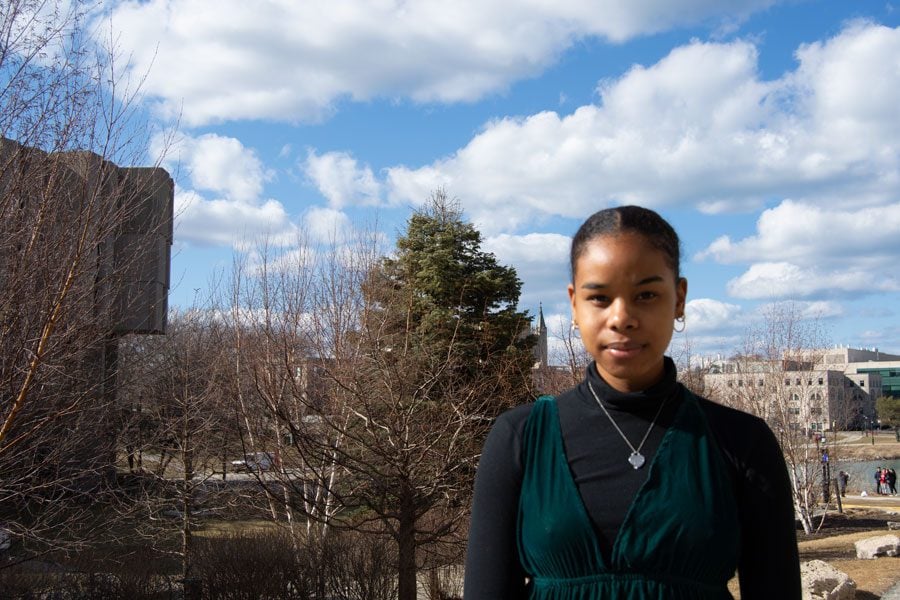First-generation, low-income students discuss hypocrisies of the college admissions scandal
Marissa Martinez/Daily Senior Staffer
Yasmine Diara. Diara is one of many students frustrated with the hypocrisies of the elite college admissions scandal.
April 19, 2019
Rick Singer, the head of the college-admissions preparation business implicated in the nationwide admissions scandal, described the college admissions process as consisting of three methods, or “doors.” There’s a front door, getting in on a student’s own merit; a back door, through paying for institutional advancement like paying for buildings; and his own creation, a side door.
Only one of those three doors was available to SESP junior David Guirgis, a first-generation, low-income student — albeit barely.
“I had to kick down the front door to get here,” he said.
Guirgis is one of several first-generation and low-income students who were upset and frustrated by the cheating scandal that broke last month, which prompted many to take to the Internet and share personal narratives and critiques of the elite college application process.
The most famous celebrities indicted for fraud and bribery include Felicity Huffman and Lori Loughlin, but two Northwestern parents, Manuel and Elizabeth Henriquez, have been charged as well.
When Medill sophomore Cayla Clements got a news notification about the scandal, she said she was shocked, especially as a “Full House” fan, a show in which Loughlin starred. Clements said she grew angry because of how easy it is for wealthy students to gain entrance into top opportunities and schools.
Coming from a low-income family, Clements said the college application process was difficult because of how meaningful going to college was to her. She was so nervous to finally receive the results she was “shaking” from fear of not getting into Northwestern. When Clements found out she was admitted, she said she cried — she didn’t think it was possible.
“Suddenly, I have almost a way out of something like intergenerational trauma and poverty and hardship,” Clements said. “The act of getting higher education, getting a degree, especially from a school like Northwestern, is really important to me and I feel like my success is standing on it.”
Guirgis echoed this sentiment, saying he knew places like Northwestern are not meant for students like him. For a while, he didn’t consider the University a place he could actually attend. Many students aren’t confident in their admission, he said, but for those from his background, “it’s impossible.”
Yasmine Diara, a pre-med fourth-year studying French and biology, said she wasn’t surprised Northwestern was named in the scandal. She said it was “ironic” to see systems of privilege for wealthy white students so legitimized.
Diara went to Gretchen A. Whitney High School in Cerritos, California, and said she was one of three black students in her graduating class in a predominantly Asian school. Many of her classmates went to schools like USC, which was a primary university named in the affidavits.
“Here you have the disposable income to pay for tutors, to go to after school programs, to play expensive, prestigious sports and do all those things that colleges are looking for,” Diara said. “Then, as a minority from an immigrant family, not necessarily having access to all those things — I had to work my ass off regardless to be the best in everything I was doing and struggle through it a little bit, whereas it came a lot easier to some other people.”
Diara said even before the news broke, her interactions with students of color have been different than those with white students when it comes to discussing systemic barriers. While she finds it easy for students with marginalized identities to empathize with her struggles, and vice versa, she said white students find it hard to conceptualize the barriers their less-privileged counterparts face.
Clements said one good thing came out of the conversation on social media platforms like Twitter: the mutual support from other students who came from similar backgrounds. She said although imposter syndrome — a thought pattern where individuals doubt their own capabilities, especially heightened by holding underrepresented identities — has impacted her heavily, it felt good to know she and other marginalized students earned their spot at Northwestern.
“It made me feel really empowered and proud of where I come from because, yeah, we didn’t have to rely on our parents to get us into college,” Clements said. “We got there on our own with our own intelligence, with our own means, our own efforts and I’m proud of that honestly.”
Guirgis said he also felt the camaraderie from being on Twitter and seeing impactful stories from fellow first-generation and low-income students about discrimination they’ve faced on campus or remember from high school.
He said making fun of the situation and families involved was helpful, especially when he considered students like Olivia Jade, who infamously mentioned in a vlog that she “didn’t really care” about school, despite being fraudulently accepted into USC.
“We were able to kind of laugh through our tears and joke around about this,” Guirgis said. “You look at these people who are fighting to get into college because that is their only chance at some sort of social mobility. That’s a really tough thing to grapple with but sometimes all you can do is laugh.”
Email: [email protected]
Related Stories:
— Henriquezes appear in court on charges of fraud, judge sets conditions of release
— Documents show how parents helped their child cheat to get into Northwestern
— Parents of Northwestern students implicated in high profile college admissions cheating scandal


